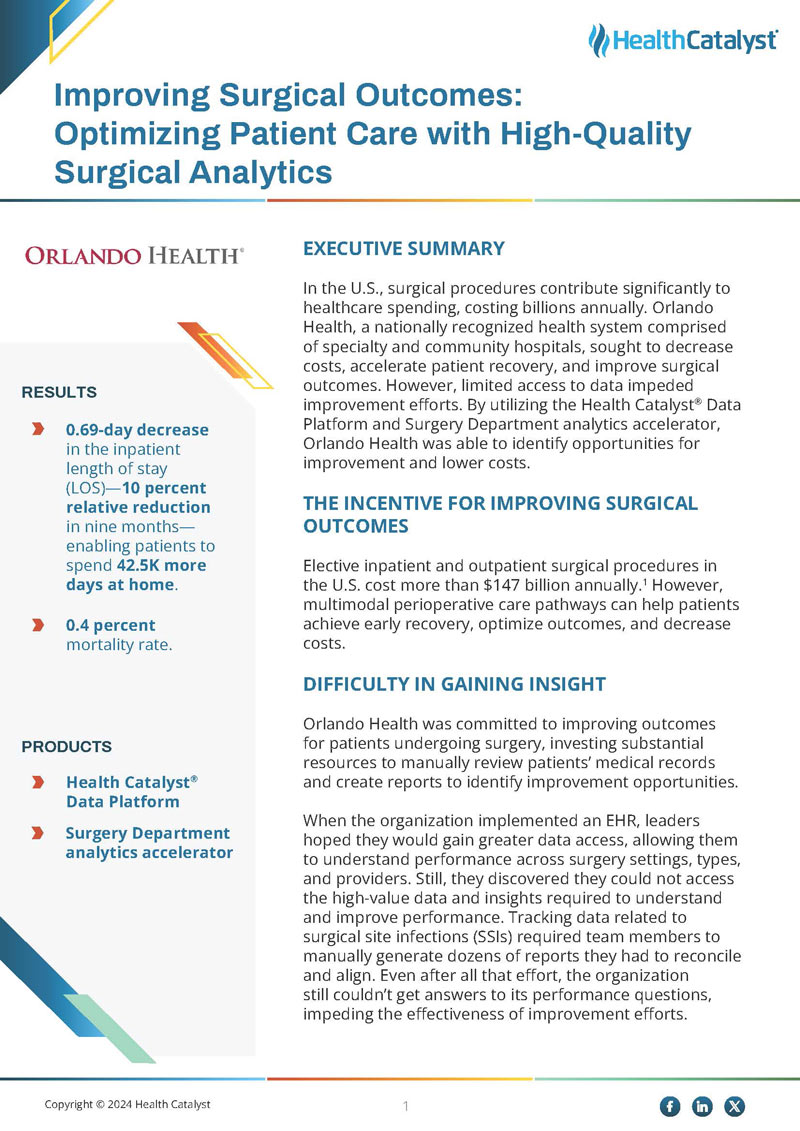In the U.S., surgical procedures contribute significantly to healthcare spending, costing billions annually. Orlando Health, a nationally recognized health system comprised of specialty and community hospitals, sought to decrease costs, accelerate patient recovery, and improve surgical outcomes. However, limited access to data impeded improvement efforts. By utilizing the Health Catalyst® Data Platform and Surgery Department analytics accelerator, Orlando Health was able to identify opportunities for improvement and lower costs.
Elective inpatient and outpatient surgical procedures in the U.S. cost more than $147 billion annually.1 However, multimodal perioperative care pathways can help patients achieve early recovery, optimize outcomes, and decrease costs.
Orlando Health was committed to improving outcomes for patients undergoing surgery, investing substantial resources to manually review patients’ medical records and create reports to identify improvement opportunities.
When the organization implemented an EHR, leaders hoped they would gain greater data access, allowing them to understand performance across surgery settings, types, and providers. Still, they discovered they could not access the high-value data and insights required to understand and improve performance. Tracking data related to surgical site infections (SSIs) required team members to manually generate dozens of reports they had to reconcile and align. Even after all that effort, the organization still couldn’t get answers to its performance questions, impeding the effectiveness of improvement efforts.
The solution for Orlando Health’s data and analytics needs was the Health Catalyst® Data Platform and Surgery Department analytics accelerator. The organization uses the Surgery Department analytics accelerator to gain access to the high-value data and analytics necessary to analyze and improve performance.
Using the analytics accelerator, Orlando Health has visibility into multifaceted metrics for all patients undergoing surgery. The organization can readily access summary data and drill into patient-level detail, enabling it to understand, monitor, and improve performance. Orlando Health can now ask and answer questions like:
Orlando Health uses its high-value data to determine the unique improvement opportunities for various patient populations across its health system. It routinely shares location and population-specific data with each team member involved in providing care to surgical patients. Teams then implement location and population-specific improvement opportunities, focusing on multimodal perioperative care pathways to optimize patient readiness for surgery and improve early recovery and postoperative outcomes.
Orlando Health addresses unique patient needs while completing all elements of the multimodal perioperative care pathway and evaluating adjustments in care processes on patient outcomes. For example, the organization identified that many pediatric patients with autism spectrum disorder who are undergoing surgery often have sensitivity to touch. This can make it challenging to perform preoperative skin antisepsis protocols while patients are fully awake. Orlando Health adjusted the timing of some activities to occur after these patients received sedation for their procedure, decreasing patient anxiety. The organization used its analytics application to monitor performance to ensure the expected care was provided and confirm that the changed workflow still resulted in high-quality patient outcomes.
The analytics application enables improvement teams, surgeons, and patient care teams to visualize and understand the direct impact of their work and improvement activities on patient outcomes, accelerating continuous improvement. Leaders can proactively identify unfavorable changes, intervening to prevent performance deterioration.
Orlando Health also shares pediatric data with a third-party organization that benchmarks it against 140 other children's hospitals, supporting performance improvement and the development of targeted interventions for pediatric care.
Orlando Health’s data-informed surgical improvements have improved care quality, optimized patient outcomes, and decreased costs. Results include:
* Numerous throughput and clinical documentation improvement initiatives likely had a positive impact on LOS.
“With the Health Catalyst Data Platform, we have access to high-value, actionable data that enables us to identify and act on key improvement opportunities across all facilities and all surgery settings.”
- Jill Nykanen, RN, MSN, CPHQ, Chief Quality Officer, Orlando Health Arnold Palmer Hospital for Children, Assistant Vice President, Orlando Health
Orlando Health plans to use its high-value data and analytics to further improve the care provided to patients undergoing colorectal surgery and those receiving a hysterectomy.


